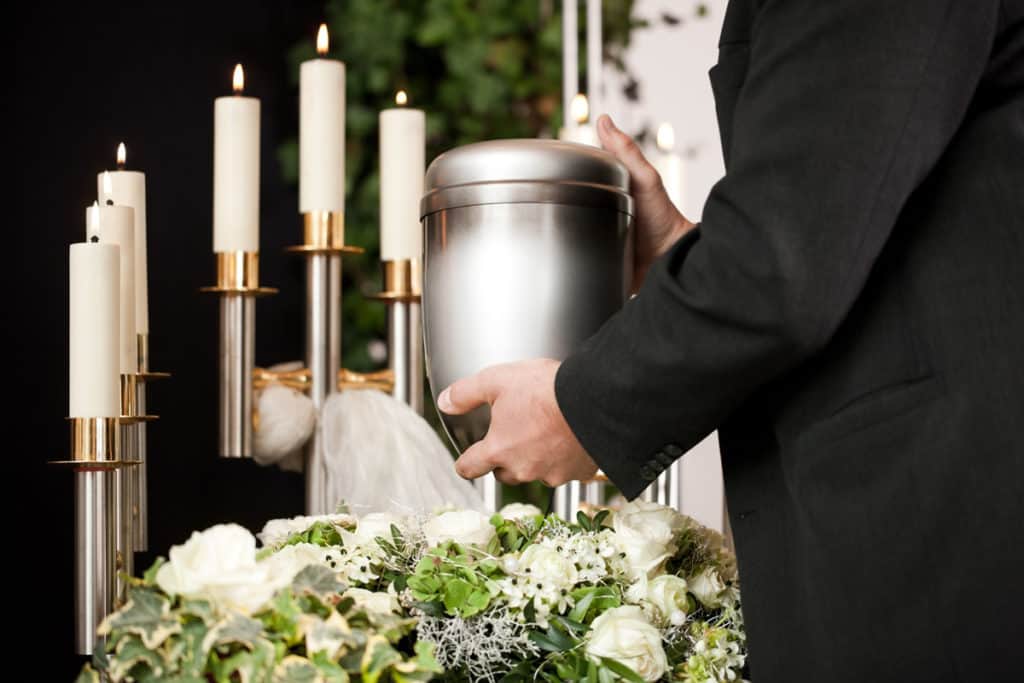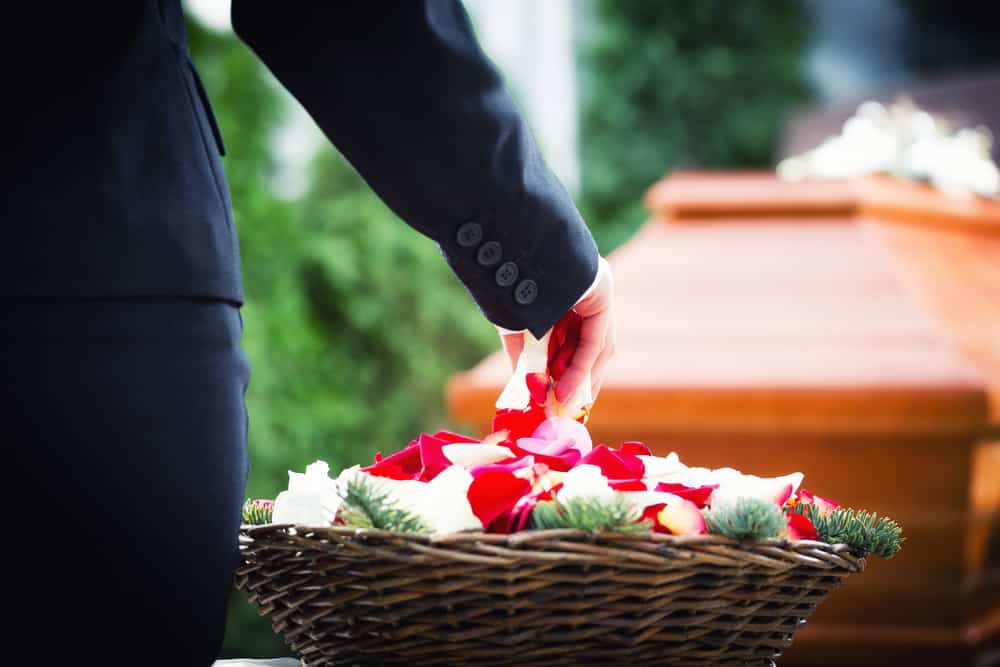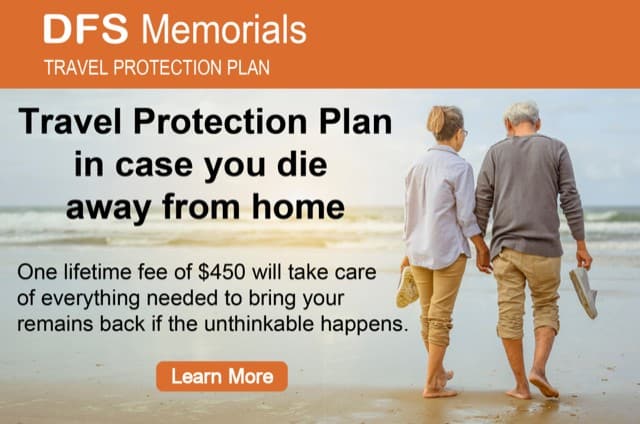Arranging a funeral or cremation in Massachusetts
This funeral-planning guide from US Funerals Online aims to explain some of the main things you need to know if you are planning a funeral or cremation in Massachusetts. Funeral legislation does actually vary somewhat state-by-state due to local licensing laws, so we have attempted to give you a basic overview of how Massachusetts’s funeral legislation affects you as a consumer when purchasing funeral products and services.
How do you choose which funeral home or cremation provider is right for your needs?
This is probably the most important aspect of arranging a funeral or cremation, ensuring you select the right service provider for your needs. This can be quite daunting, especially if you have no recommendations from family or friends.
There are around 970 funeral homes and crematories in Massachusetts, so it can help to have some criteria to narrow your selection down.
Are you looking for traditional or modern services? Do you require burial or cremation? Is your budget and the costs of the funeral an important aspect of selecting a provider?
Once you have a clear outline of your specific needs, it can be easier to shortlist funeral providers who fit your needs.
How do I find a funeral home or cremation provider in Massachusetts?
You can use a directory, such as US Funerals Online, which lists all funeral homes and cremation providers by city. You can use other online directories, but just be aware that many directories charge a fee for inclusion or to feature certain providers at the top of the results.
Online results can be influenced by funeral homes that advertise. It is wise to shortlist 2-3 funeral providers and either make calls or visit, to establish whether they can meet your needs.
If you just want to arrange a simple direct cremation service, you can often do this without visiting a funeral home. More funeral homes are offering online arrangements portals to simplify the process of cremation arrangements.
If the cost of funeral expenses is an important factor in your selection, you may wish to visit DFS Memorials and locate your nearest low-cost funeral and cremation provider.

Do you want a burial or cremation?
This is the first question that a funeral director will ask you and the most significant decision to be made to determine what kind of funeral service you require. If the deceased has not expressed a preference or left instructions, then you must make this decision.
It should be made entirely by personal and family choices. Burial has traditionally been more common, although cremation is fast becoming a preferred choice and now accounts for almost 60% of all dispositions.
A cremation can prove far less expensive than a burial, an influencing factor for many today who opt for cremation.
Can I arrange a home funeral or green burial in Massachusetts?
Yes, the laws in Massachusetts allow you to conduct your own funeral services, and you do not legally have to employ a funeral director if you desire not to. A home funeral or family-directed funeral is one where the family conducts all care and preparation of their lost loved one and transports him or her to the cemetery or crematory for disposition.
Visit our Guide to Arranging a DIY Funeral or Family-Directed Funeral.
A green burial, or natural burial, is when no embalming, metal casket, or concrete grave liner is used. In some ways, it can be considered returning to a more organic and natural method of disposition, as was the ‘norm’ centuries ago.
There are a number of green burial cemeteries in Massachusetts. Most of them are ‘hybrid’ cemeteries, which means they are existing traditional cemeteries that have added a dedicated green burial section.
Use our Green Burial Directory and Guide to locate a cemetery near you and learn more about organizing a Green Funeral.
A very informative resource from the Funeral Consumers Alliance of Western Massachusetts also provides resources that outline green burial cemeteries in Massachusetts.
Although not widely available yet, there are other green funeral alternatives entering the death care sector as society is leaning towards seeking more sustainable alternatives to traditional burial or flame cremation.
Visit our detailed Guides to Water Cremation (Aquamation) and Human Composting (Natural Organic Reduction) to learn more.
What is the cost of a funeral or cremation in Massachusetts?
Prices for a cremation or burial vary by area and funeral home, so it can be quite difficult to quote a general price for services. The National Association of Funeral Directors quotes the average price of a funeral today at $7,848 (NFDA 2022), although this does not include cemetery costs.
How much a funeral costs is rather like how long is a piece of string. It depends on what basic and ancillary services you enlist from your funeral director and what minimal or elaborate funeral products you select.
A simple cremation can be conducted for around $1,400. Do check out the DFS Memorials providers for Massachusetts if you are particularly concerned about keeping funeral costs low.
Funeral legislation dictates that you must be shown a general price list (GPL) breaking down any and all services that you are offered with a total price before you sign any funeral services contract.
If you purchase a casket or burial container from your chosen funeral home, you must also be provided with a Casket and Burial Container price list.
Check out our Ultimate Guide to Cremation to learn everything about Cremation Services.
Sending funeral flowers in Massachusetts
Flowers are considered an integral part of funerals, yet many are cutting back on funeral flowers to save money on their overall funeral expenses. The average funeral flower arrangement can start at around $60.00, with casket sprays costing up to $700.00.

Is embalming required in Massachusetts?
No, embalming is not required by law in Massachusetts. Some funeral homes may recommend embalming should you request a viewing or if the funeral is to be postponed for some considerable time. A body can be adequately stored in a refrigerated unit, so do not feel pressurized to undertake the embalming of your loved one if you do not wish to.
What are my options for purchasing a casket or alternative container?
The introduction of the Federal Trade Commission’s ‘funeral rule’ means that you have the right to purchase a casket from elsewhere than your funeral home if you wish to. Consumers have been saving money for some years by purchasing a casket from a third-party casket retailer.
Your funeral home MUST accept your purchased casket and cannot charge you a handling surcharge. However, the impact of discounted retail casket sales and the increase in cremation rates has prompted many funeral homes to now price-match third-party casket prices.
Check out our Guide to Purchasing a Casket to read more.
A basic standard casket can be purchased for around $995. It is also legal to rent a casket for the purpose of a funeral service and then use an alternative container for the burial or cremation.
For a cremation in Massachusetts, regulations require that the body be placed in a “suitable container” (M.G.L. c.114, s. 44A), and this container may be a plywood or strong cardboard box. No casket is legally required for burial, although cemeteries may stipulate their own regulations.
How to arrange a cremation in Massachusetts
A cremation can only be performed after the required 48-hour period has elapsed. It must be conducted at a licensed crematory, and the required authorization and cremation permits must be obtained.
You can arrange your own cremation directly with a crematory; however, the deceased must be transported to the crematory in a vehicle licensed for this purpose. For this reason, families usually employ a funeral director to collect the body and handle the refrigerated storage for the 48-hour period required.
Cremated remains or ashes are returned to the family after the cremation process and can be interred, kept in an urn, or scattered.
What are burial and cemetery plot requirements in Massachusetts?
The Board of Health regulates public and private burial grounds. Public cemeteries each have governing regulations, which will typically stipulate requirements you must observe when interring your loved one’s remains.
Although a casket is not required by law, cemeteries may stipulate that an outer burial container is used to prevent subsidence. Similarly, certain rules may be in place that affects what type of monument you can erect and what period of time may elapse after burial before a grave marker can be erected. It is wise to thoroughly review a cemetery’s regulations before committing to a plot.

Can I pre-plan a funeral or cremation in Massachusetts? How does state law govern pre-need plans?
Yes, you can pre-plan a funeral or cremation in Massachusetts. In fact, it is a good way to ensure your wishes are observed and the finances are earmarked. These days with more people struggling to make their retirement savings last through their senior care years, it can be a means to ensure you have allocated funds for death care. Funds put into a funeral insurance plan are not considered when you are means-assessed for aid.
In Massachusetts, only licensed funeral directors can sell preneed contracts. A trust fund or an insurance policy can fund these contracts. You should revisit and revise your contract every few years to ensure it still fully meets your needs.
Do consider that funeral prices can, and are, changing quite significantly right now. In fact, more affordable options are coming onto the market daily. And do ensure that your family is aware that you have a plan and where the details of it are kept.
The other option is to set up a payable-on-death (POD) account, otherwise known as a Totten Trust. You can deposit the funds required to cover your funeral expenses and make a member of your family the beneficiary who can withdraw the funds on your death. A benefit of this kind of trust is that it does not have to go through probate.
What are the laws for scattering ashes in Massachusetts?
There are no specific laws on ash scattering in Massachusetts, much like many other states in the US. Cremated remains are basically sterile, organic matter and, therefore, of no harm to the environment.
Common sense should prevail, and you should follow guidelines for the scattering of ashes, as we have outlined in our ash scattering section.
If you wish to scatter ashes off Cape Cod, in Nantucket Sound, or at sea, you must observe Environmental Protection Agency (EPA) guidelines. This requires that remains be scattered 3 miles off the coast. Massachusetts is in Region 1 of the EPA, and the New England department can be contacted at (888) 372-7341.
An ash-scattering sea burial costs around $500, depending on the service selected and whether you opt for an attended burial.
What help is available with funeral expenses in Massachusetts?
For indigent residents of Massachusetts, the Massachusetts Department of Transitional Assistance (DTA) pays for part of the funeral cost for MassHealth (Medicaid) members and other low-income, financially qualified individuals.
The DTA will pay up to $1,100 for funeral expenses that do not exceed $1,500. You must inform your chosen funeral director that you are claiming a Medicaid or MassHealth funeral, and the funeral director will then bill the DTA.
The deceased’s family must pay the remaining $400 to the funeral home.
There is also a $255 lump-sum death benefit payable from Social Security for those that qualify, and there are benefits for veterans, the veteran’s spouses, and certain dependents.
Interment at a VA cemetery is free, as is the grave marker and a US flag. The VA cemetery is at Bourne and still offers both casketed and cremated remains interment. There are also state-run VA cemeteries at Agawam and Winchendon. Contact your local VA office for more information.
Are whole-body donations permitted in Massachusetts?
Yes, you can bequeath your body to science in the state of Massachusetts. This means your body is used for medical research and anatomy teaching. Four educational institutions in Massachusetts offer a body donation program. The requirements for donation differ for each school, so you will need to check with the institution directly.
The institutions offering whole-body donation programs in Massachusetts are Harvard Medical School, University of Massachusetts Medical School, Tufts University School of Medicine, and Boston University School of Medicine.
What do you do if your loved one dies away from Massachusetts, or you wish to repatriate the deceased to their home country?
This, unfortunately, happens more often these days as people travel more. To transport a body internationally or domestically can add a significant cost to your overall funeral expenses. However, a funeral director experienced in funeral shipping can arrange everything for you.
To read further about funeral shipping, how to arrange it, and what it costs, visit our funeral shipping section.
If you do travel regularly for work, pleasure, sport, visiting family, or snow-birding, you may wish to consider our great value Travel Protection Plan. This plan costs just $450 for an individual for lifetime protection against the costly expense of returning a body home if a death occurs 75 miles (or further) from your residence in Massachusetts. It also provides global coverage. Domestic funeral shipping can cost from $3,000, and International repatriation can start at around $6,900.
Visit our article on Travel Protection: Your Guide to Affordable Funeral Shipping, or click on the link below to enroll today.
If you do travel regularly for work, pleasure, sport, visiting family, or snow-birding, you may wish to consider our great value Travel Protection Plan. This plan costs just $450 for an individual for lifetime protection against the costly expense of returning a body home if a death occurs 75 miles (or further) from your residence. It also provides global coverage. Domestic funeral shipping can cost from $3,000, and International repatriation can start at around $6,900.
How to obtain a copy of a death certificate in Massachusetts?
A copy of a death certificate can be obtained from the Office of Vital Records and Statistics (OVR). You can obtain copies either in person, by mail, or online. Copies obtained over the counter cost $18.00, and by mail, a copy is charged at $28.00.
Online certificated copies of a death certificate can be ordered online via Vitalchek. The first copy costs $45.00, with further copies being charged at $37.00.
The Registry of Vital Records and Statistics office is located at:
150 Mt. Vernon Street, 1st Floor
Dorchester, MA 02125-3105

What should you do if you have a complaint about funeral or cremation services or products you have purchased?
If you should feel that you have a grievance or complaint about a licensed funeral establishment in Massachusetts, you can contact the Division of Professional Licensure (DPL), which is the agency within the Office of Consumer Affairs and Business Regulation that licenses funeral homes.
DPL, 1000 Washington Street, Suite 710, Boston, Massachusetts, 02118 (617) 727-7406
A couple of consumer groups aim to educate and support local people about their rights and options in purchasing funeral products and services. You can contact the groups below for further local information:
Funeral Consumers Alliance of Eastern Massachusetts (FCAEM), 66 Marlborough Street
Boston, MA 02116 Phone (617) 859-7990
Funeral Consumers Alliance of Western Massachusetts (FCAWM), P. O. Box 994, Greenfield, MA 01302-0994 Phone (413) 774-2320
Related Articles:
- Guide to buying a casket
- Guide to sending Flowers to a funeral
- Understanding the FTC Funeral Rule
- Glossary of Funeral Terms: How to Understand the General Price List
Resources:


